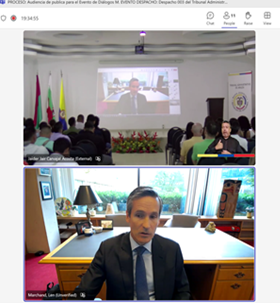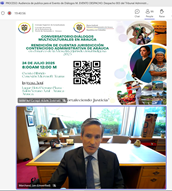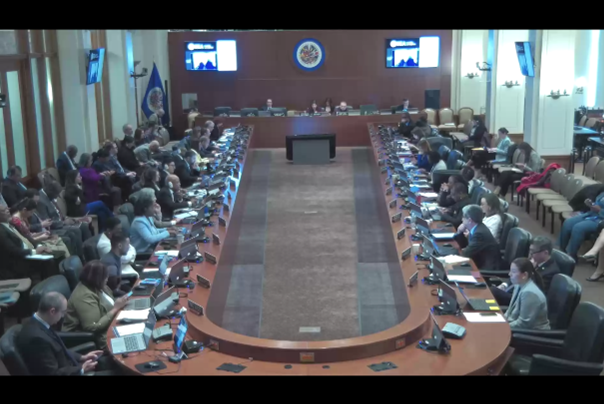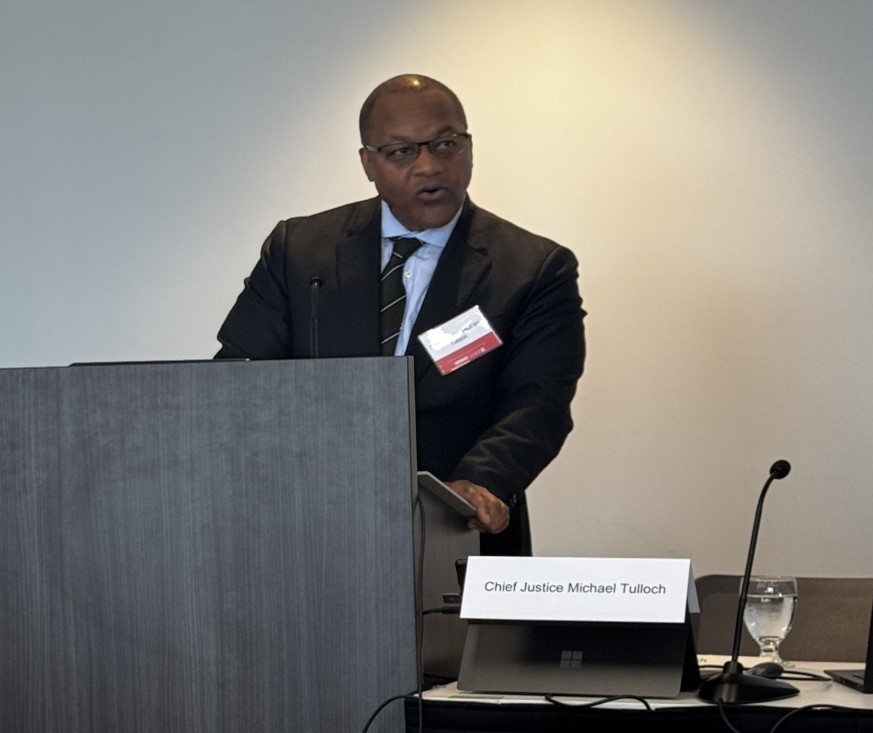Latest News
August 19, 2025
Chief Justice Marchand Shares Canadian Experience on Legal Pluralism at Colombian Judicial Dialogue.
 On July 24, 2025, Chief Justice of British Columbia Leonard S. Marchand delivered a virtual keynote address at the Mesa Interjurisdiccional Indígena, hosted by the Tribunal Administrativo de Arauca, Colombia. The event brought together judicial leaders, Indigenous authorities, and academic experts—including representatives from the Tribunal Administrativo de Arauca, the Consejo de Estado, the Jurisdicción Especial para la Paz, and the Consejo Seccional de la Judicatura.
On July 24, 2025, Chief Justice of British Columbia Leonard S. Marchand delivered a virtual keynote address at the Mesa Interjurisdiccional Indígena, hosted by the Tribunal Administrativo de Arauca, Colombia. The event brought together judicial leaders, Indigenous authorities, and academic experts—including representatives from the Tribunal Administrativo de Arauca, the Consejo de Estado, the Jurisdicción Especial para la Paz, and the Consejo Seccional de la Judicatura.
CJ Marchand’s presentation, “Pluralism and Inclusion: Creating Space for Indigenous Legal Systems,” delivered a compelling overview of Canada’s journey toward legal pluralism, marked by sincere reflection, transparency, and a forward-looking spirit. Chief Justice Marchand shared Canada’s experience implementing legal pluralism through landmark developments such as the federal legislation to align laws with the UN Declaration on the Rights of Indigenous Peoples, and the Act respecting First Nations, Inuit and Métis children (which recognizes Indigenous jurisdiction over child and family services). He emphasized that legal pluralism must be paired with genuine inclusion, not just recognizing Indigenous legal orders but reshaping state systems to make space for them. He highlighted the University of Victoria’s ground-breaking joint law degree in Canadian common law and Indigenous legal orders – the first of its kind globally- and spoke of the critical importance of preparing future lawyers to work across legal traditions with respect and competence. He also reflected on the evolving role of courts, noting that decisions like Dickson v. Vuntut Gwitchin First Nation mark a significant shift in how Canada reconciles collective Indigenous rights with individual constitutional protections.
 In thanking him, Colombian organizers remarked:
In thanking him, Colombian organizers remarked:
“Your insights offer valuable guidance – not for us to imitate or replicate, but to help nourish our own journey. As you rightly emphasized, this is about sustaining a meaningful dialogue between justice systems.”
Chief Justice Marchand concluded by wishing participants a productive day of dialogue and reflection, noting that while Canadian solutions may not translate directly to the Colombian context, sharing experiences can support mutual learning and respect.
Archives
JUNE 2025
June 09, 2025
The Office of the Commissioner for Federal Judicial Affairs (FJA) is proud to announce two new international partnerships under the 2025–26 Technical Assistance Project (TAP-FJA), funded by Global Affairs Canada.
In Ecuador, we’re building on last year’s work with the National Court of Justice to strengthen understanding between Indigenous and national justice systems. This new phase will deepen engagement with Indigenous legal traditions and promote jurisdictional clarity among justice actors.
In Armenia, FJA will collaborate with the Supreme Judicial Council to support more effective judicial responses to drug-related offences with a special focus on youth and women. The initiative will introduce Canadian innovations like drug treatment and youth courts and apply the Risk-Need-Responsivity model to help address the root causes of criminal behaviour.
We’re honoured to contribute to more inclusive, responsive, and equitable justice systems around the world.
APRIL 2025
April 24, 2025
A New Five-Year Development Assistance Project: Equal Justice for All in Mongolia (EJAM)
The Office of the Commissioner for Federal Judicial Affairs (FJA) is very pleased to announce that it has recently been awarded a new five-year development assistance project called Equal Justice for All in Mongolia (EJAM), funded by Global Affairs Canada.
EJAM emerged directly from FJA’s two years of engagement with the Mongolian judiciary under the TAP project. Through TAP, FJA provided expert technical assistance to Mongolia on strengthening judicial independence, judicial ethics and accountability, and improving judicial communications to the public including media relations. What began as a short, quick-impact intervention under TAP has now evolved into a full-scale, multi-year judicial reform initiative. EJAM builds directly on this momentum – demonstrating how quick wins can lay the groundwork for sustained institutional partnerships.
Through EJAM, FJA will support Mongolia in developing a more citizen-centred and gender-sensitive judicial system, improving public trust in the judiciary through greater transparency, and increasing access to justice for women, girls, and members of vulnerable or disadvantaged groups. EJAM is an example of how TAP continues to expand Canada’s judicial cooperation with developing countries – translating Canadian expertise into globally meaningful results.
MARCH 2025
March 19, 2025
 |
The TAP project highlighted at OAS General AssemblyThe TAP program was on the agenda for the March 19 meeting of the General Assembly of the Organization of American States. At the invitation of the Canadian Permanent Mission to the OAS, FJA International Director Oleg Shakov described the TAP program and the opportunities it affords to developing country partners. He was followed by two TAP partners, the Honourable Jose Dionicio Suing Nagua, Chief Justice of the National Court of Justice of Ecuador, and Magistrada Hilda González Neira, Justice of the Supreme Court of Colombia. Justices Nagua and Neira expressed thanks to Canada for the support provided through TAP and the collaborative nature of the relationship. acknowledged out collaboration on the issues addressed by the two projects. |
Justice Neira, who worked with FJA on responses to gender-based violence in Colombia, stated “It’s not just words on paper; we live and breathe what we have worked on together.” Their appreciation was echoed by the missions of Ecuador and Colombia, thanking Canada for our support to strengthening the Rule of Law and Democracy.
NOVEMBER 2025
November 20, 2024
A major highlight was their participation in the Canadian Institute for the Administration of Justice’s Symposium on Indigenous Justice Systems in Calgary from November 4-6. At the symposium, Chief Justice Nagua emphasized the ongoing efforts in Ecuador to strengthen the rights of the indigenous population through constitutional mechanisms, while acknowledging the substantial work still required. He expressed keen interest in learning from both the achievements and challenges encountered by Canada in this field.
This visit forms part of a year-long engagement between FJA and Ecuador, under the auspices of the Government of Canada’s Technical Assistance Partnership program, funded by Global Affairs Canada.
OCTOBER 2025
October 23, 2024
October 18, 2024
The International Programmes Division of the Office of the Commissioner for Federal Judicial Affairs (FJA) is pleased to announce that it has confirmed a visit to Canada this November by a delegation of Ecuadorean judges, led by the Chief Justice of Ecuador, to examine the treatment of Aboriginal issues in the Canadian justice system and share knowledge on Indigenous Justice in Ecuador.
The visit will include attendance at a Symposium on Indigenous Justice November 4-6 in Calgary, hosted by the Canadian Institute for the Administration of Justice. The delegation will also observe specialized courts and Aboriginal justice initiatives across Canada and will visit the Supreme Court of Canada.
This trip is part of a larger engagement in which Canada will support the Ecuador judicial system with the integration of Indigenous Justice practices. The visit is organized and hosted by FJA under the Technical Assistance Partnership program, funded by Global Affairs Canada.
For more information on the Symposium, visit: https://ciaj-icaj.ca/en/upcoming-programs/symposium-on-indigenous-justice-systems/
For more information on the TAP program and the role Canadian judges are playing, visit: https://ciaj-icaj.ca/en/international/technical-assistance-partnership-project-federal-judicial-affairs-canada/


